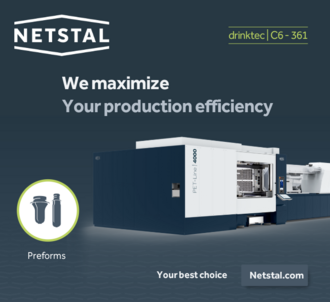Blowmoulding outlets grew with more than 25% of the resulting RPET, or nearly a quarter on a million tonnes, used to produce containers in 2010. The 2010 share of fibres as an end use for recycled PET flake decreased to 39% although the overall tonnage rose slightly. The strapping market rebounded with the resumption of construction and manufacturing after the recent recession. Nearly 100,000 tonnes of RPET were used in this application in 2010. There was a 25,000 tonne decrease in RPET used in the APET sheet market. This was attributed to higher volumes of sheet imports and the price of suitable quality RPET almost matching that of virgin PET for most of the year.
It was estimated that there is a total mechanical reclamation capacity in the European region of 1.7 million tonnes.
Exports to the Far East fell for a second year to 13% of collected PET and imports of baled PET bottles from outside the area were also smaller.
All but 2 of the surveyed countries have a collection rate above the 22.5% target rate for plastic recovery set by the Packaging Waste Directive. The collection rate by country depends on the maturity and extent of their collection systems as well as economic instruments in place. Collection rates of over 70% are being recorded by many countries.
“I am delighted that PET collection increased again last year” said Robert Bertaggia, Chairman of the Petcore Board. He further commented that “with every European country collecting PET bottles, the high year on year increases of earlier years had to fall, but the 6.5% increase in 2010 is an excellent result. The PET industry chain has worked with Compliance Agencies, National Bodies and European Recyclers to achieve a collection rate of nearly 50% of all PET bottles placed on the market”.
The Chairman of the EuPR PET Working Group, Casper van den Dungen, agreed. “Capacity utilisation of our recycle plants is only 79% at present. This provides the challenge for municipalities, other collectors and industry to increase the current collection rate beyond 50% to load the recycling facilities already in place”.
He continued, “Recycled PET is a reliable and sought-after feedstock in the PET value chain and sustainable, long life uses are being developed to utilise the growing supply of recycled PET. Whether PET bottles are recycled into another bottle, fibre, sheet, strapping tape or one of the new applications the energy saving will be significant“.
Both Chairmen emphasised that Petcore and EuPR will endeavour to ensure that the growth in PET recycling continues. “This sustainable growth reflects the expectations of consumers who themselves are an important part of the recycle chain.”
Petcore’s publication, PET Profile, has been updated to include the 2010 collection figures.


Petcore and EuPR publish PET collection figures for 2010 - European PET bottle collection increases by more than 6%
Blowmoulding outlets grew with more than 25% of the resulting RPET, or nearly a quarter on a million tonnes, used to produce containers in 2010. The 2010 share of fibres as an end use for recycled PET flake decreased to 39% although the overall tonnage rose slightly. The strapping market rebounded with the resumption of construction and manufacturing after the recent recession. Nearly 100,000 tonnes of RPET were used in this application in 2010. There was a 25,000 tonne decrease in RPET used in the APET sheet market. This was attributed to higher volumes of sheet imports and the price of suitable quality RPET almost matching that of virgin PET for most of the year. It was estimated that there is a total mechanical reclamation capacity in the European region of 1.7 million tonnes. Exports to the Far East fell for a second year to 13% of collected PET and imports of baled PET bottles from outside the area were also smaller.All but 2 of the surveyed countries have a collection rate above the 22.5% target rate for plastic recovery set by the Packaging Waste Directive. The collection rate by country depends on the maturity and extent of their collection systems as well as economic instruments in place. Collection rates of over 70% are being recorded by many countries.“I am delighted that PET collection increased again last year” said Robert Bertaggia, Chairman of the Petcore Board. He further commented that “with every European country collecting PET bottles, the high year on year increases of earlier years had to fall, but the 6.5% increase in 2010 is an excellent result. The PET industry chain has worked with Compliance Agencies, National Bodies and European Recyclers to achieve a collection rate of nearly 50% of all PET bottles placed on the market”.The Chairman of the EuPR PET Working Group, Casper van den Dungen, agreed. “Capacity utilisation of our recycle plants is only 79% at present. This provides the challenge for municipalities, other collectors and industry to increase the current collection rate beyond 50% to load the recycling facilities already in place”.He continued, “Recycled PET is a reliable and sought-after feedstock in the PET value chain and sustainable, long life uses are being developed to utilise the growing supply of recycled PET. Whether PET bottles are recycled into another bottle, fibre, sheet, strapping tape or one of the new applications the energy saving will be significant“.Both Chairmen emphasised that Petcore and EuPR will endeavour to ensure that the growth in PET recycling continues. “This sustainable growth reflects the expectations of consumers who themselves are an important part of the recycle chain.”Petcore’s publication, PET Profile, has been updated to include the 2010 collection figures.
The comPETence center provides your organisation with a dynamic, cost effective way to promote your products and services.

magazine
Find our premium articles, interviews, reports and more
in 3 issues in 2025.






